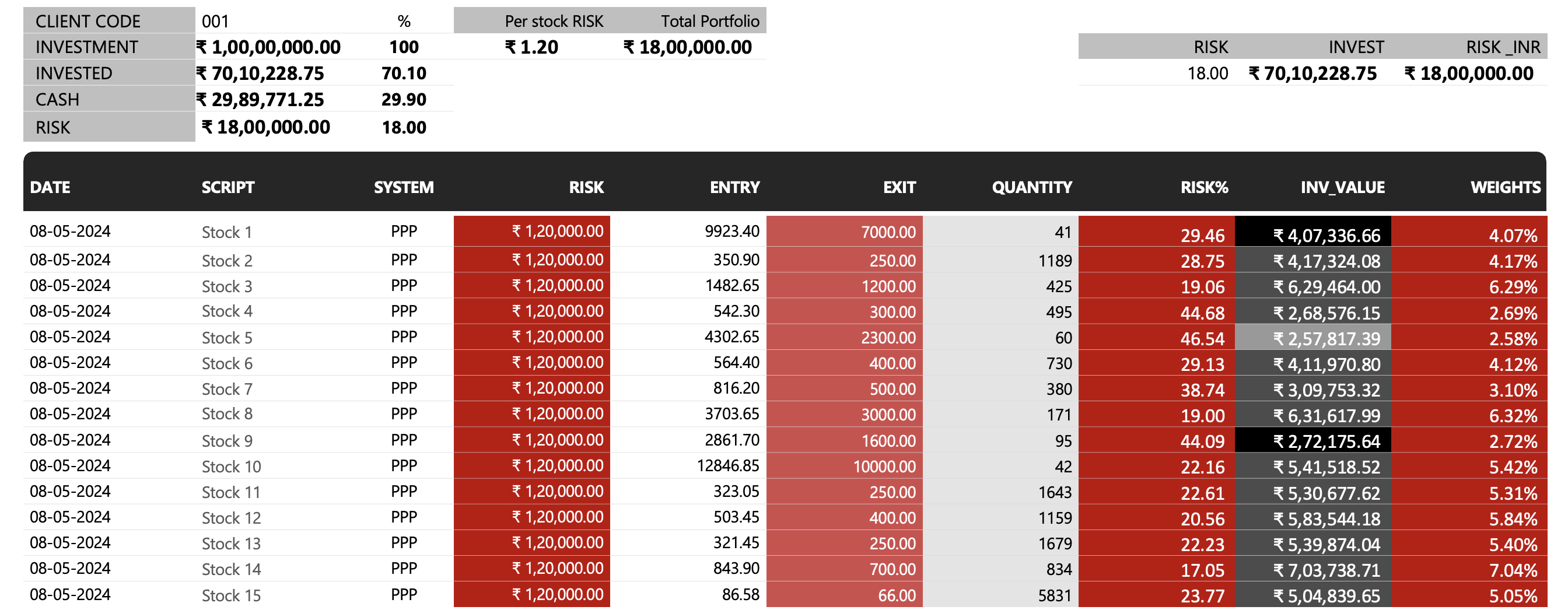Core Purpose
To Generate Exceptional Alpha through a Quantitative Investment approach, ensuring that every decision is data-driven and without any human biases.

Benefit of Our Quant Investing Framework
“Our Endeavour is to have that 80%+ of our portfolio remains in the ADD and HOLD categories.”
Super Performers
- ATH Price
- ATH Profit
- Outperformance relative to BSE 500
Performers
- ATH Profit
- Outperformance relative to BSE 500
- Stock Above Turtle Exit Price
Under Performers
- ATH Profit
- Outperformance relative to BSE 500
- Stock Above Turtle Exit Price
Benefit of Our Quant Investing Framework
“Our Endeavour is to have that 80%+ of our portfolio remains in the ADD and Hold categories.”
SuperPerformers
- ATH Price
- ATH Profit
- Outperformance relative to BSE 500
Performers
- ATH Profit
- Outperformance relative to BSE 500
- Stock Above Turtle Exit Price
- ATH Profit
- Outperformance relative to BSE 500
- Stock Above Turtle Exit Price
Ethos of Turtle’s Quant Process
Made with 20 Years of Experience by Rohan Mehta (CEO & Portfolio Manager)
Extremely Simple and fuelled with Speed
We know when to Hold, Run, Fold or Walk Away.
To Hold North, To Sell South & To Replace East & West Stocks
We Love our Clients Profit more than the Invested Companies
PPP Investment ProcessTM
Price
- Stocks at All Time High Price
- Outperformance at All Time High
- Deciding EXIT before ENTRY
Profits
- Profits at All Time High
- Turnaround Businesses
- Leadership/ Emerging Company
People
- Meeting Management
- Scuttlebutt Research
- Due Diligence
5 Crazy Features of Turtle's Quant Process
Turnaround
Business
Top 750 Companies of India
Outperformance of Stock to BSE 500
EXIT (Downside) is decided before ENTRY
Portfolio Allocation based on Risk Parameters
Turtle Quant-Driven Investment Principles
1
No Minimum Holding Bias
2
No Investing in SIN Business
3
No Sector Bias
4
No Market Cap Bias
5
No Model Portfolio Allocation Bias
6
No Averaging Loser
7
No Premature booking profits
8
No Falling In Love With Stocks
9
No Entry before deciding Exits
10
No Complex Fee & Structure
3 Phases of Turtle's Quant Process
Turtle's Investment Approach
1. Selection & Research
Stock Selection Process
All Time High
Price
All Time High
Profits
All Time High Outperformance
Turnaround
Story
Pre-Decided
Exit
Key Trigger For Turnaround Businesses
Management / Financial Restructuring
Strategic Mergers or Acquisitions
Diversification into New Business Lines
Shift in Sectorial Demand
Regulatory and Policy Support
Turtle's Scoring Process
Daily ATH Stocks -02/5/2024


Simplify Quants
- All Time High Price
- All Time High Profit
- All Time High Outperformance
- Each Parameter accounts for 1 score
- We take Companies that score 3 for further research
2. Allocation & Risk Management
Quantitative Allocation Process
Risk per Stock = Max of 1.2% of Invested Value
Deciding Exit before we enter
No Model Allocation Approach
Allocation based on the Risk Approach, is purely dynamic
Re allocation of stock is also based on Quants
Turtle Risk Management Framework for Allocation

Please note that this is sample data and is intended for informational purposes only. It does not guarantee any accuracy and should not be construed as an investment recommendation.
3. Holding Review
Turtle Revision Process

Reasons WHY you should NOT Invest with Turtle
If your investment horizon is lesser than 2100 Days, you should not invest.
If you can’t see your portfolio Down by 21%, you should not invest.
If you expect High returns before 1000 days of investment, you should not invest.
If you have taken loan/bank CC and doing investments to get the difference of returns, you should not invest.
If your love for Profits is higher than the Process or Quality of Business we have invested, you should not invest.
If you expect we will ALWAYS be in profits and ALWAYS outperform the benchmark, you should not invest.
If you can’t wait for last 20% of the time for 80% of the returns, you should not invest.
If you expect we will always outperform Interest rates every month, and every year there would be profits, you should not invest.
If you are going to continuously compare Our Portfolio with other or different Asset class, you should not invest.
If any of this point you don’t agree, on a serious note you should not invest with us.
Interviews
Portfolio Management Services
Wealth Mantra PMS
“Curated for Investors Looking for Great Companies with Low Volatility”
1 Year CAGR
28.04%
Minimum Investment
50 Lakhs
Growth Mantra PMS
“Curated for Investors Looking for High-Growth Companies with a Pinch of Volatility”
1 Year CAGR
22.00%
Minimum Investment
50 Lakhs
Profit Mantra PMS
“Curated for special ones looking for Customised Investment requests”
1 Year CAGR
19.07%
Minimum Investment
5 Cr.






